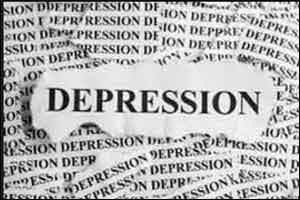- Home
- Editorial
- News
- Practice Guidelines
- Anesthesiology Guidelines
- Cancer Guidelines
- Cardiac Sciences Guidelines
- Critical Care Guidelines
- Dentistry Guidelines
- Dermatology Guidelines
- Diabetes and Endo Guidelines
- Diagnostics Guidelines
- ENT Guidelines
- Featured Practice Guidelines
- Gastroenterology Guidelines
- Geriatrics Guidelines
- Medicine Guidelines
- Nephrology Guidelines
- Neurosciences Guidelines
- Obs and Gynae Guidelines
- Ophthalmology Guidelines
- Orthopaedics Guidelines
- Paediatrics Guidelines
- Psychiatry Guidelines
- Pulmonology Guidelines
- Radiology Guidelines
- Surgery Guidelines
- Urology Guidelines
Weekend working associated with increased depression risk, suggests new study

Working weekends is associated with an increased risk of depression in both sexes, suggests an observational study.
In addition the study has also found that working very long hours─55+a week─is linked to a heightened risk of depression in women.The study has been published in the Journal of Epidemiology & Community Health.
Over two-thirds of men worked weekends compared with around half the women.
There was no difference in the number of depressive symptoms between men who put in fewer or more hours than the standard working week, or who worked weekends.
But weekend working was associated with significantly more depressive symptoms among men when work conditions were accounted for; among women, depressive symptoms were associated with the number of weekends worked.
It is compulsion of modern world to work outside standard ‘office’ hours due to expansion of the global economies that has been associated with poorer physical health.But the potential impact on mental health is less well known. And research to date has largely focused on men and/or on specific jobs, say the researchers
To try and put this right, the researchers drew on data from Understanding Society, the UK Household Longitudinal Study (UKHLS). This has been tracking the health and wellbeing of a representative sample of 40,000 households across the UK since 2009.
The researchers focused on data for 11,215 men and 12,188 women from the second wave of the UKHLS in 2010-12 as this included information on employment.
Depressive symptoms were measured using a validated general health questionnaire (GHQ-12).
Using the standard working week of 35 to 40 hours as a reference, working weeks were categorised as fewer than 35 to include part-time employees; 41-55 (long working hours); and 55 and above (extra long working hours).
The researchers factored in several potentially influential contributors: age; marital status; parenthood; earnings and satisfaction with them; long term health conditions; job type and satisfaction with it; degree of control; and qualifications.
Generally, older workers, smokers, and those who earned the least and who had the least job control were more depressed. And this applied to both sexes.
But gender differences in working patterns were evident.
Men tended to work longer hours than women, with almost half clocking up more than the standard quota compared with fewer than one in four women. And nearly half of the women worked part-time compared with just one in seven (15%) men.
Married women who were also parents tended not to work longer hours, but the opposite was true of married fathers.
And women who worked 55 or more hours a week and/or who worked most/every weekend had the worst mental health of all, with significantly more depressive symptoms than women working standard hours.
By way of an explanation, the researchers suggest that women are more likely to work longer hours in male-dominated occupations, while those working weekends tend to be concentrated in low paid service sector jobs.
“Such jobs, when combined with frequent or complex interactions with the public or clients, have been linked to higher levels of depression,” they write.
“Our findings of more depressive symptoms among women working extra long hours might also be explained by the potential double burden experienced by women when their long hours in paid work are added on their time in domestic labour,” they suggest.
“Previous studies have found that once unpaid housework and caring is accounted for, women work longer than men, on average, and that this has been linked to poorer physical health,” they add.
This is an observational study, and as such, can’t establish cause. But the researchers nevertheless conclude: “Our findings should encourage employers and policymakers to consider interventions aimed at reducing women’s burdens without restricting their full participation in the workforce, and at improving psychosocial work conditions.”
For more details click on the link: doi/10.1136/jech-2018-211309

Disclaimer: This site is primarily intended for healthcare professionals. Any content/information on this website does not replace the advice of medical and/or health professionals and should not be construed as medical/diagnostic advice/endorsement or prescription. Use of this site is subject to our terms of use, privacy policy, advertisement policy. © 2020 Minerva Medical Treatment Pvt Ltd